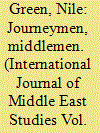|
|
|
Sort Order |
|
|
|
Items / Page
|
|
|
|
|
|
|
| Srl | Item |
| 1 |
ID:
143105


|
|
|
|
|
| Summary/Abstract |
This article begins by asking how African traders learn to adjust to the foreign world of Guangzhou, China, and suggests that African logistics agents and middlemen serve as cultural brokers for these traders. After defining “cultural broker” and discussing why these brokers are not usually Chinese, it explores this role as played by ten logistics agents/middlemen from Kenya, Nigeria, Ghana and the Democratic Republic of the Congo. As logistics agents, these people help their customers in practically adjusting to Chinese life, and as middlemen they serve to grease the wheels of commerce between African customers and Chinese suppliers. This is despite their own ambivalent views of China as a place to live. They play an essential role in enabling harmonious relations between Africans and Chinese in Guangzhou, even though they see themselves not as cultural brokers but simply as businessmen.
|
|
|
|
|
|
|
|
|
|
|
|
|
|
|
|
| 2 |
ID:
090385


|
|
|
|
|
| Publication |
2009.
|
| Summary/Abstract |
Within a few years of 1820, Muslim-owned printing presses were established under state sponsorship in Iran, Egypt, and India, marking the true beginning of printing in the Islamic world. Printing projects had been initiated before this period-most famously by Ibrahim Müteferrika (1674-1745) in Istanbul-but these were isolated and unsustained ventures. None gathered the joint momentum of state support and technological transfer to compare with what emerged simultaneously in Tabriz, Cairo, and Lucknow. In attempting to understand the common processes behind this "triplet" birth of Muslim printing, this article reconstructs the small circle of individuals whose at times discordant projects collided in creating a sustainable Muslim print tradition in several distinct centers around 1820.
|
|
|
|
|
|
|
|
|
|
|
|
|
|
|
|
| 3 |
ID:
161702


|
|
|
|
|
| Summary/Abstract |
Exploring the rise and fall of government compradors, this article highlights Sino-British collusion in the corruption and extortion cases of the Hong Kong colonial government in the 1840s and the 1850s. A number of compradors worked for the Hong Kong colonial government throughout the nineteenth century, acting as a key communication channel between Chinese residents and colonial officials in the formative years of the colony. Various institutions of the colonial government, for instance the Colonial Treasury, Post Office, and British military, employed compradors. Colonial officials also personally employed compradors, who supported their principals’ work in the government. However, a symbiotic relationship between corrupt colonial officials and compradors had become a public problem by the mid-1850s. The colonial government responded to this by diversifying its Chinese staff rather than depending on monopolistic compradors, and also launched a scheme to nurture and employ British personnel who could act as intermediaries between the British and Chinese communities. At the same time, different kinds of Chinese intermediary elites emerged in Hong Kong from the 1860s onwards, and government compradors’ monopolistic authority in mediating between colonial officials and the Chinese public gradually declined. The volatile government comprador system highlights a key phase in the history of the evolution of the comprador system in Hong Kong.
|
|
|
|
|
|
|
|
|
|
|
|
|
|
|
|
|
|
|
|
|